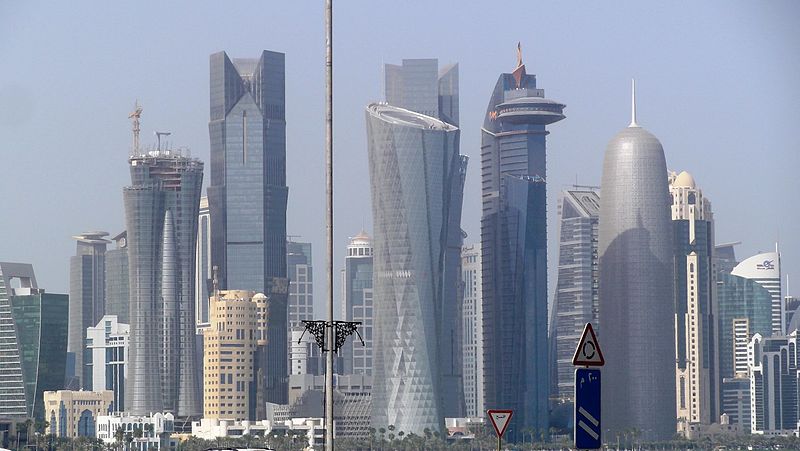This past summer, a number of countries under Saudi and UAE pressure severed diplomatic relations with the Qatari Government. Flight bans were implemented, exports halted, and Qatar was handed a list of demands with which to comply if normal diplomatic relations were to resume. They included severing relations with the Muslim Brotherhood and other Islamist Groups inside Syria, as well as the shutting down of Turkish airbases in the country and the closure of media outlets like Al-Jazeera and others.
Several months later Qatar has not yet ceded to these demands, and neither Saudi Arabia nor the UAE has relented in demanding they be implemented. Opposition groups inside Syria remain divided, and both sides seem unwilling to back down.
On the 12th of October, the head of the Middle East and North Africa Programme at Chatham House, Lina Khatib, gave a talk at Harvard titled “Behind and Beyond the Gulf Crisis,” addressing the power dynamics behind the crisis in the Gulf, its motivations, and implications for conflicts in the region. In a packed room, Khatib outlined how Qatar’s ambitions to portray itself as a regional superpower impelled Saudi Arabia and the UAE to put it in its place. Focusing not just on the regional politics of the Gulf, Khatib also argued that the causes underlying this crisis lay too in Syria and the funding of various opposition groups there. From the outset Khatib was keen to stress that internal politics cannot and should not be detached from regional politics.
Qatari Foreign Policy, Pragmatism, and its mistakes in Syria
Khatib began her talk by mapping Qatari Foreign Policy in the build up to the crisis. In particular, she noted that it was pragmatic and lacked a real long term strategy. Qatar sought to present itself as an alternative to Saudi Arabia, and was met with stiff reaction as a result.
Khatib saw evidence for this increased desire for Qatari influence in Syria, where Qatar has funded groups like the Muslim Brotherhood in spreading its influence further throughout the region. Numerous other Islamist groups located in Northern Syria have received Qatari funding as well. This level of influence was seemingly excessive in the eyes of Saudi Arabia and the UAE, who countered by funding their own Islamist groups in a move not too dissimilar from sponsoring different factions inside Libya.
This split between Qatari influence in the North of Syria and Saudi influence in the South has contributed greatly to the complexity of the Syria crisis. While Saudi pressure on Qatar to reduce its funding to these groups did result in the reining in funding to groups considered more extreme, Khatib noted that the Qatari Emir, “Tamim couldn’t go very far to stop Qatari funding of these groups due to fear of internal political repercussions.” Khatib noted that Qatari royals, as well as many others in the Gulf, use the funding of foreign militias for domestic political bargaining. In a bid to maintain domestic political order, Emir Tamim was unable to crack down heavily on members of his own family who continued to fund groups not aligned with American, European, and Saudi interests.
Saudi concerns and Emirati ambition
So why this sudden decision to isolate a neighbor and vital trade partner? Khatib argued that this was both due to Saudi concerns and UAE ambitions. In terms of the Saudi regional view, any threat to its hegemony has and will always be treated as a top priority. Khatib also alluded to the role of domestic politics inside the Saudi royal family. The standoff between the new Crown Prince and Defense Minister, Muhammad Bin Salman, and the old guard, consisting of the former Crown Prince and nephew of King Salman, Muhammad Bin Nayif, is well documented. With the latter perceived as having closer ties with Qatar, Muhammad Bin Salman could have sought to isolate Qatar in order to curb his cousin’s influence.
Regarding the reasons behind Emirati support, Khatib saw this crisis as an ambition to curb Qatari influence. Like Qatar too, the UAE has sought to shape its global image through public diplomacy, the proliferation of think tanks, and the media. Unlike Qatar, the UAE has come to the conclusion that to gain significant influence in the region a good relationship with Saudi Arabia must be guaranteed. Instead of presenting itself as an alternative to Saudi Arabia, the UAE has instead chosen to portray itself as its principal partner.
Wider Implications and resolutions
Khatib stressed the need for calm when analysing the effects of this crisis. Whilst recognising the significance of closer ties to Iran as a result of the ending of flights and trade embargos, Khatib dispelled notions of a resulting formation of a Qatari-Iranian axis. She was frank in stating that too close an alignment with Iran would be political suicide, and that this was a case of Qatar trying to assert sovereignty while remaining pragmatic.
Khatib was also frank in her assertion that a resolution to this crisis was not a top priority for any of the countries involved, and that both sides were willing to wait it out. The main implications she derived were therefore wider in scope. She said, “The Gulf crisis is not just about internal dynamics, it is much more than that. It has much wider implications.”
And so, Khatib ended by focusing on the effect this ongoing crisis would have on Syria, in particular the effect a divided opposition (split between Qatari influenced groups in the North and Saudi influenced groups in the South) would have on efforts to establish a united opposition to the Assad regime. The initiative to establish a united Syrian National Army, effectively new version of the Free Syrian Army, under the command of the Ministry of Defense of the Interim Government, faces difficulties due to Gulf-based factional differences. And so while the cooling of intra-Gulf relations may withstand the test of time, its effects on the Syria conflict could prove disastrous.
